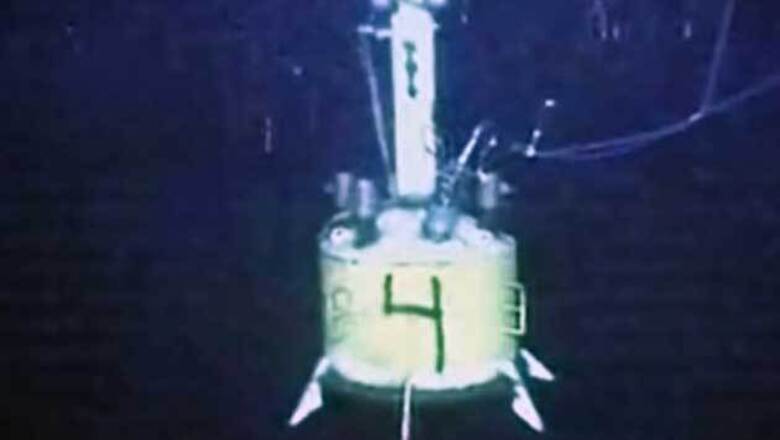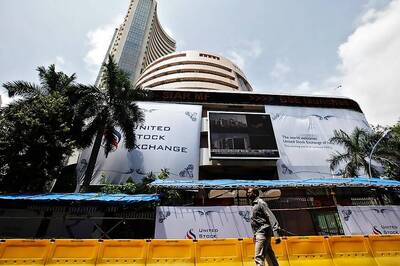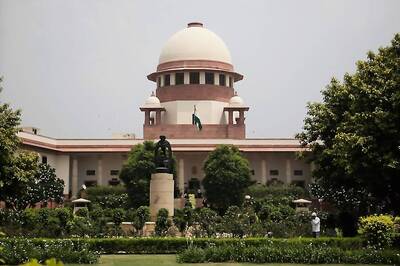
views
Washington: British energy giant British Petroleum (BP) Plc's stock price plunged to a 14-year low in US trading on Wednesday amid concerns over its ability to meet mounting costs of the giant Gulf of Mexico oil spill.
President Barack Obama's administration, getting tough as polls show public disapproval over its handling of the worst oil spill in US history, threatened new penalties on the company. BP depositary shares trading in New York fell nearly 16 per cent to close at $ 29.20, their lowest level since August 1996, on jitters about the costs the company will have to assume.
BP said last week it has "plenty of" cash to deal with the problem and the Obama administration has made similar comments.
A BP spokesman said "nothing has changed" since Friday and restructuring experts agreed that by running the numbers alone, BP looked able to handle the financial damage.
But such confidence was not evident in the market. "It seems that shares are under pressure from the fear of whether BP can survive. It is not just a rumor about the potential of a dividend cut in BP anymore.
Now it's about the survivability of the company," said Jon Najarian, a founder of Web information site optionMonster.com in Chicago.
US Interior Secretary Ken Salazar told a Senate hearing he would ask BP to repay salaries of any workers laid off because of the six-month moratorium on deepwater exploratory drilling imposed by the US government after the spill.
Turning up the heat on the British oil major, a senior US Justice Department official said after the markets closed that the department was "planning to take action" to ensure BP had enough money on hand to cover spill damages.
BP's total bill so far, including cleanup costs, has reached $ 1.25 billion and the US government has already said it will have to pay billions more in penalties.
The White House echoed Salazar's comments. "The moratorium is as a result of the accident that BP caused.
It is an economic loss for those workers, and ... those are claims that BP should pay," White House spokesman Robert Gibbs told a briefing.
BP believes it may be heading for a showdown with the White House over widening liability demands, a BP source said. While the company has said it will pay for the clean-up and direct damages to those affected by the spill, the moratorium was a government decision and costs related to it were a different matter, the source said.
Earlier, the company's stock closed down 4 per cent in London on concerns the company might have to suspend its dividend payment.
US politicians have been calling for this, saying the company should put its cash into paying for legal claims and environmental damage in the Gulf.
After contaminating wetland wildlife refuges in Louisiana and barrier islands in Mississippi and Alabama, the black tide of crude oil has taken aim at some of the famous white beaches of Florida, whose economy is heavily dependent on tourism.
One-third of the Gulf's federal waters are closed to fishing and the toll of dead and injured birds and animals is climbing. Frustration with BP and the US government's response to the leak is growing in southeastern Louisiana, where fishing bans are taking a heavy toll on the local economy.
Joan Strohmeyer, who owns the Lighthouse Lodge in Venice, Louisiana, said her hotel is fully booked with BP workers and others responding to the spill, but that may not last.
"Is there going to come a time where I have nobody in my hotel?" she asked. "I don't know whether we're going to end up being ahead or behind."
CONFIDENCE 'HAS DISAPPEARED' At a congressional hearing on Wednesday, one lawmaker asked US Associate Attorney General Thomas Perrelli whether the Justice Department had the ability to issue an injunction against BP to stop it paying its dividend.
"We are looking very closely at this and we are planning to take action," he said. With Wednesday's share price drop in New York, BP has given up more than half its market value since the crisis began.
"The confidence in BP being able to stop the oil leak and deal with the ecological aftermath has disappeared," said TD Ameritrade chief derivatives strategist Joe Kinahan. Illustrating analysts' anxiety about BP's dividend, in the past two days alone, seven have cut their expectations on the likely payout. The cost of protecting BP's debt against default hit new highs on Wednesday.
The spill began on April 20 after an oil rig exploded, killing 11 workers and rupturing the deep-sea well. It has caused environmental devastation along the US Gulf Coast and threatens lucrative fishing and tourist industries. The Obama administration, facing growing voter discontent over its own handling of the crisis, has sought to distance itself from the company. Obama has also toughened his rhetoric in recent days and said in an interview this week he would fire BP CEO Tony Hayward if he worked for him. In a further sign of the administration's pressure on BP, Coast Guard Admiral Thad Allen, who is leading the government relief effort, demanded that the company provide more information and transparency on how it was meeting damages claims by individuals and businesses affected by the spill.
"The federal government and the public expects BP's claims process to fully address the needs of impacted individuals and businesses," Allen said in a June 8 letter to BP.
BP has paid out close to $ 50 million in damages claims so far along the Gulf Coast, mostly to fishermen, shrimpers, and boat operators who say their livelihoods have been hit by the spill.
STILL NO HANDLE ON THE FLOW RATE
Allen told reporters that BP planned to move another rig to the spill site on June 14. This would enable the company to boost its capacity to collect oil from the well to 28,000 barrels (1.18 million gallons/4.45 million liters) a day. Allen did not indicate this meant the flow rate of the oil could be as high as 28,000 barrels a day, but his comments are likely to underscore that neither BP nor the government have yet managed to determine just how much oil is gushing out.
Government scientists have estimated the leak spews 12,000-19,000 barrels a day, with one estimate as high as 25,000.
New estimates are expected later this week or early next week. BP's latest containment effort, which follows a series of earlier failed attempts, involved placing a containment cap with a seal on a deep-sea pipe from which the oil is gushing. But the ultimate solution to the leak lies in the drilling of a relief well and that won't be completed before August.



















Comments
0 comment